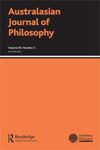反对头脑简单的案例:Śrīgupta关于心理流变学
IF 1
2区 哲学
0 PHILOSOPHY
引用次数: 1
摘要
有一条共同的推理路线认为,意识体验的非凡统一是建立在一个类似头脑的简单主体之上的。相反,从西佛(7-8世纪)开始的Mādhyamika佛教哲学家认为,任何形式的心理简单都是不连贯的,因此在形而上学上是不可能的。由于缺乏任何统一的原则,意识体验的非凡统一反而是一种毫无根据的幻觉。在这篇文章中,我分析了希里古普塔反对心理简单的“既不是一个也不是多个论点”,并展示了他的推理路线是如何被一组关于意识及其有意对象的性质和关系的隐含问题所驱动的。这些问题不仅为几个世纪以来佛教内部关于这个话题的辩论设定了议程,而且这些问题也是任何统一意识或简单经验主题的捍卫者都应该得到回应的问题。本文章由计算机程序翻译,如有差异,请以英文原文为准。
A Case Against Simple-mindedness: Śrīgupta on Mental Mereology
There ’ s a common line of reasoning which supposes that the phenomenal unity of conscious experience is grounded in a mind-like simple subject. To the contrary, M ā dhyamika Buddhist philosophers beginning with Ś r ī gupta (seventh – eighth century) argue that any kind of mental simple is incoherent and thus metaphysically impossible. Lacking any unifying principle, the phenomenal unity of conscious experience is instead an unfounded illusion. In this paper, I present an analysis of Ś r ī gupta ’ s ‘ neither-one-nor-many argument ’ against mental simples and show how his line of reasoning is driven by a set of implicit questions concerning the nature of and relation between consciousness and its intentional object. These questions not only set the agenda for centuries of intra-Buddhist debate on the topic, but they are also questions to which any defender of uni fi ed consciousness or a simple subject of experience arguably owes responses.
求助全文
通过发布文献求助,成功后即可免费获取论文全文。
去求助
来源期刊

AUSTRALASIAN JOURNAL OF PHILOSOPHY
PHILOSOPHY-
CiteScore
2.60
自引率
0.00%
发文量
51
期刊介绍:
The Australasian Journal of Philosophy (AJP) is one of the world''s leading philosophy journals. Founded in 1923, it has been continuously published ever since. It is recognized as one of the best in the analytic tradition, but is not narrow in what it regards as worthy of acceptance. Heavily cited in the general philosophical literature, it is covered by all the major abstracting and indexing services, including the Arts and Humanities Citation Index® which provides access to current and retrospective bibliographic information and cited references found in the world''s leading arts and humanities journals. In addition to Articles and Discussion Notes, the journal publishes Book Reviews and Book Notes as well as occasional commissioned Critical Notices. The journal is read world-wide and has recently published contributions from North and South American, European and Asian as well as Australasian authors.
 求助内容:
求助内容: 应助结果提醒方式:
应助结果提醒方式:


